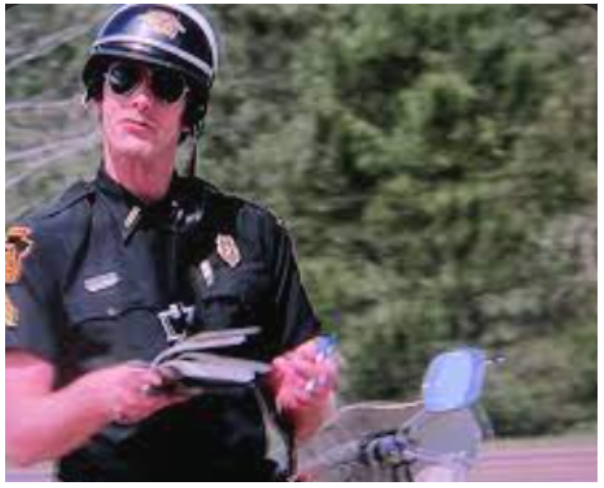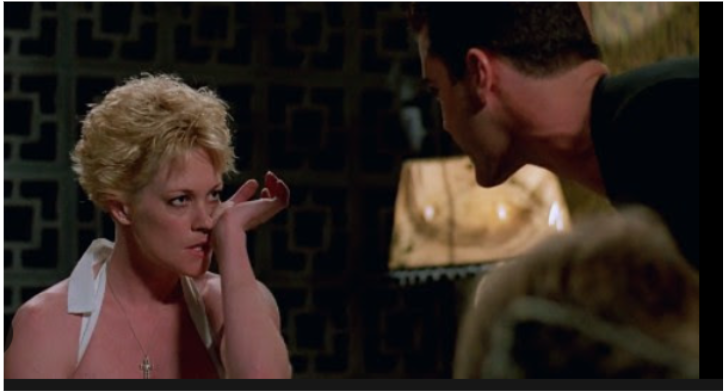Director J Demme
This film sticks with you like a threat from Ray Liotta’s darkest character (which very well may be this one). You won’t forget Melanie Griffith’s transformation from Egyptian queen/beatnik into hometown high school hottie, or anything else in this weird 80s neo-noir mash-up. From the initial shots to the soundtrack to the awesome cameos, there is something happening on-screen every single scene.
Something Wild starts right where it should, when the two leads are drawn together by an act of crime; Charles (Jeff Daniels) stiffs his lunch waitress in the first of the film’s several dine-and-dashes, and Lulu (Griffith), a fellow patron, chases him onto the street to call him out on it. (If you didn’t know, Melanie Griffith’s Lulu shares a hair-do with 1920’s It girl Louise Brooks; Lulu was Brooks’ most indelible role).
The It Girl of the 80s
Lulu acts incensed, but she’s a thief herself, and dubbing Charles a “closet rebel” for shitting on a lunch waitress’s tips is a little much. Soon the newly dubbed rebel has to answer his telepager, but he has a hard time unclipping it from his belt while he’s holding an umbrella on this balmy day. Whatta rebel.
Our It Girl tricks Charles (or Charlie as she gleefully dubs him in the first of the film’s transformations) into a road trip with obvious romantic undertones. Luckily she drives an absolute treasure of a car—half her personality is the car—so that makes up for the vacuum of sexual chemistry in the vehicle. And she tosses his telepager out the window, so who’s the rebel now?
Still figuring out how he got here
Lulu - “Are you saying we are not going to get a hotel room because you’re saving for Christmas presents? In June?”
Charlie will always be the type of guy who reads the waitress’s name tag, “to make things a little friendlier,” as he puts it. This goes completely against the inciting event, Charles’s crime in the first scene, but whatever. Massive tonal shifts are this movie’s special strength since it’s part road-trip movie, part noir, part comedy, part romance, part thriller.
In perhaps Melanie Griffith’s best movie lines outside of Working Girl, she swaps witty repartee with John Sayles (director of Men With Guns and Eight Men Out) who plays a motorcycle cop in one of the film’s many cameos.
Audrey 'Lulu' Hankel: I've been admiring your bike.
Cop: Oh, you interested in motorcycles?
Lulu: No, I just like big things between my legs.
Handsome Cop Double Take
This movie is worth seeing just for the Americana and cameos. And if you don’t like the song “Wild Thing,” you’re bound to like it by the end with this many renditions.
The plot is straightforward—after meeting at the diner, Lulu gets Charles into her car, renames him Charlie, and then takes him on an impromptu road trip to Pennsylvania for her high school reunion (the obvious destination of every devil-may-care free spirit). Lulu’s transformation into Audrey completes itself at her reunion with a new hair-do and Charlie as arm candy, directly before Ray Liotta blazes onto the screen as her (not quite) ex. Then the movie snaps into focus.
Lulu and Charlie have merely been bumbling along until James Dean’s darker twin pops up in the form of Ray Liotta’s Ray, newly disgorged from prison and ready to pop with chaotic violence. Now the real spirit of the movie comes out to play like a (very) malevolent Puck.
Face-off at the 7-11
All along we thought we were watching a screwball comedy or a road-trip love story, when really it’s Ray’s revenge that keeps this going. (Dark-haired Veronica was pissed to be left stranded at the 7-11, but she gets the best end out of all of them.) Ray commandeers the rest of the film, making the characters shed their skins and bleed.
Some viewers are jarred by the sudden change in mood as the last sixteen minutes deal out real violence. The yuppie dream turns into yuppie nightmare as Charlie’s facade of suburban success crumbles—he lives in an empty house, sleeping on a Lazy-Boy on his screened-in porch surrounded by Sad Dad detritus. Turns out Lulu isn’t the only one with secrets; Charles’s wife left him nine months ago for the tennis (ice skating?) instructor.
What does this tale teach us? Don’t give in to your inner rebel if you aren’t really the rebellious type as you will be mowed down by the truly rebellious and malevolently violent—our man Ray.
Not enough transformations in the world to escape him
The real tragedy is innocent Charlie stabbing Ray in the chest during the final tussle, turning one man as dark as his counterpart.
“I finally made it to the suburbs.” -Ray
Noir likes to examine what separates good from bad and how easily this line is blurred with the right pressure. And nothing blurs that line and brings two guys together like a knife to the chest.
In the end, the film comes full circle, back to the diner, except this time, Charlie pays his damn bill. The most shocking thing about the final scenes isn’t Charlie and Audrey’s coincidental meet-up when he most wants it to happen, or Audrey/Lulu’s never-ending supply of hats, gloves, and classic cars (femme fatale staples), it’s the price of his lunch in 1986—three dollars and fifteen cents. It made me spit out my six-dollar-a-cup coffee.
-MH
She’ll have change for a tip






